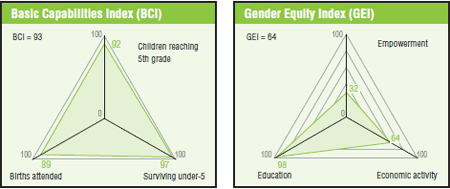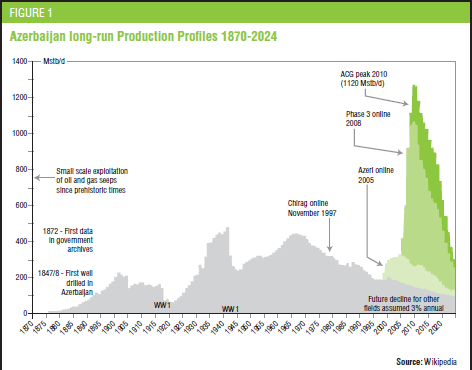The demise of the extractive economic model
Public Finance Monitoring Centre
Kenan Aslanli[1]
Public Finance Monitoring Centre
Samir Isayev[2]
One of the world’s most industrially polluted territories, the country needs to change its old resource-dependent extraction economy into a sustainable one, and also a better dialogue between Government and civil society is needed. Also, abuses against freedom of speech are frequent, as the Government systematically tries to silence political dissidents and protesters. Elections do not fully meet international standards; the Parliament is under the control of the ruling party and the courts are not independent. NGOs have been closed or denied registration.
 |
Azerbaijan faces a number of hurdles in moving towards more sustainable development, none of which are likely to be jumped soon. The country’s reliance on oil and petrochemical industries continues to cause grave environmental damage, ranging from soil contamination to water and air pollution. While the Government has taken some positive steps to address these problems, it is not clear how long these will last in the absence of serious regulatory measures. Other aspects of sustainability, primarily related to human rights, are more challenging since the ruling party controls both the Parliament and the courts, civil society is heavily controlled and political dissent and protest continue to face strong sanctions.
Serious environmental challenges
Azerbaijan faces diverse and very serious environmental challenges. In some regions, the soil is heavily contaminated by pesticides such as DDT and defoliants used in cotton crops. Water pollution is very high; only one quarter of polluted water is being treated. Nearly half of the population has no access to sewer facilities.[3] The cities of Sumgayit and the capital, Baku, are listed among the world’s most polluted.[4] Baku, particularly, ranks at the world’s lowest levels for health and sanitation.[5]
An extractive economy is not alien to this state of affairs. Being one of the birthplaces of the oil industry, Azerbaijan has a long history of economic dependency on petroleum extraction. There is evidence that petroleum was used for trade in the 3rd and 4th centuries AD, and refining activities in Baku are mentioned in the writings of 17th century Turkish scientist and traveller, Evilya Celebi. A proper oil industry was established in the late 19th century with the emergence of the so-called “oil barons,” who mastered the extraction processes and contributed to the modernization and industrialization of Baku.
Currently the petrochemical industry remains the country’s most prominent although in 2010 it had already reached its historical production peak of 1.12 million barrels per day. Some predictions show there will be a massive drop in production levels from 2015 to 2025 (see figure 1).
 |
Oil production, however, has proven not only unsustainable itself but also for the environment. Azerbaijan’s long history as an oil producer has led to high levels of pollution. During the Soviet era, residential districts of Baku, for example, were built among oil fields and industrial operations located inside the city limits with minimal or no environmental concern. In many cases the Soviet era oil industry created huge petroleum lakes which literally destroyed all of the surrounding biomass. In the last 150 years, the shores of the Caspian Sea, especially on the Abershon peninsula, have been turned into an ecological disaster with an ever-increasing amount of chemical and biological toxic waste brought from the Volga River.
Switching models
This murky scenario has made apparent an urgent need to protect the environment. Thus, in 2009, the World Bank issued a report pointing out the importance of diversifying the Azerbaijani economy in order to reduce dependency on oil and gas revenues and to develop long-term sustainability.[6] This conclusion was echoed by the Asian Development Bank in its 2010 annual survey of member states[7] and also by the Executive Board of the International Monetary Fund (IMF).
According to the IMF, “given that oil production will no longer be the main source of growth, there is an urgent need to accelerate economic diversification.” However up to 2010 non-oil sectors have not demonstrated significant growth. The growth rate in non-energy related sectors decreased from 16% in 2008 to 13% in 2010, and non-oil exports make up only 5% of the country’s overall exports. To counter this trend, the IMF exhorted President Ilham Aliyev’s administration to support the private sector through trade facilitation, tax and customs modernization and the reduction of State monopolies.[8]
The Government’s answer was to invest in a new shipbuilding plant and telecommunications projects. It also issued a decree reducing the number of inspections of private business. In July 2010, while addressing the Cabinet of Ministers, Aliyev declared that apart from the need to maintain oil production rates, the economy was developing in a diversified manner and underscored that the development of the non-oil sector was a major priority.[9]
Already in 2004, the Government had instituted a programme focused on further diversifying the economy, placing the stress on sectors other than oil as well as improving population living standards. The results up to 2011 have been positive, despite a slowdown of economic growth after the start of the global crisis in 2008. For example, the State Customs Committee reported in March 2011 that agricultural exports rose 1.38 points from 20.1% in 2010 to 21.38% in January-February 2011.[10]
In fact, nowadays the Government is also showing a modest commitment towards protecting the environment. The greatest challenge for both the Government and the private sector is to discard the old extractive model and favour investments and research in environmentally friendly technologies. The Government designated 2010 as “The Year of Ecology” and launched programmes that have included tree planting, water purification and the development of alternative and clean energy sources.
Another encouraging effort was the reshaping of refining complexes outside Baku to reduce carbon dioxide emissions near populated areas. There has also been work on rehabilitating contaminated sites. The Government power company, Azerenerji, for example, has received funding from the European Bank for Reconstruction and Development (EBRD) to rebuild the Azdres Thermal Power Plant, thus allowing it to work under the Clean Development Mechanism (CDM) under the Kyoto Protocol.
A disheartening record on human rights
Several human rights associations warn that Azerbaijan is facing important challenges regarding basic freedoms, human rights and democracy. Elections still fail to meet international standards, and there is an insufficient division of legislative and executive power with the Parliament being under the control of the ruling New Azerbaijan Party.
A civil rights organization, Article 19, issued a report in September 2010, which outlines some key findings related to freedom of speech in Azerbaijan. Among other alarming trends, the report identified acts of violence against journalists, harassment or persecution of Government’s critics and misuse of criminal law for political purposes, including the imprisonment of dissidents on charges of disorderly conduct and drug possession. By 2009, more than 50 people were considered political prisoners.[11]
Violent attacks against media representatives are frequent. In 2005, the editor-in-chief of a local magazine was shot dead by unidentified attackers following the publication of several articles that heavily criticized the authorities. Since then, a climate of violence against journalists, impunity for their attackers and harassment and imprisonment of Government critics has emerged.[12]
The use of torture and ill treatment in police stations and detention facilities have also been reported. These incidents are not properly investigated, and law enforcement officers suspected of being responsible for acts of torture are not prosecuted.
The Government also has deployed violence against protesters. The police violently dispersed demonstrations in the aftermath of the 2003 presidential elections and 2005 parliamentary elections, and none of the officers involved were punished. Since 2005, in fact, the Government has severely restricted people’s right to freedom of assembly.
Civil rights organizations and other NGOs have been closed or denied registration. Amendments to a 2009 law have allowed the Government to put NGOs under close control.[13] In April 2011, Amnesty International exhorted the authorities to halt their crackdown on freedom of assembly after the violent repression of protesters in Baku. The Public Chamber Committee, which organized the rally, claimed that at least 150 people had been arrested on the streets as they attempted to demonstrate against the Government. With all access leading to the rally site blocked, hundreds of riot police were mobilized to stop the protest, which had been organized by opposition parties through Facebook. Several journalists were forbidden to photograph or film the events, and many activists were abducted from their homes in the aftermath of the protests. At least seven people were convicted and sentenced, their trials taking place behind closed doors with the defendants having no access to legal representation. [14]
“The current Azerbaijani regime has a history of preventing and obstructing public gatherings,” said John Dalhuisen, Amnesty International’s Deputy Director for Europe and Central Asia. “Their reaction to today's protest and the demonstrations back in March this year starkly reveals the complete refusal of the authorities to tolerate any form of visible public protest.”[15]
[2] Senior research fellow
[3] Instituto del Tercer Mundo, Guia del mundo 2011-2012, (Madrid: 2010).
[4] Super Green Me, Sumgayit, Azerbaijan: The Most Polluted City in 2007, <www.supergreenme.com>; Nationmaster, Environment Azerbaijan, <www.nationmaster.com/country/aj-azerbaijan/env-environment>.
[5]T. Luck, “The world dirtiest cities”, Forbes, (New York: 2008), <www.forbes.com/>.
[6] World Bank, Country Brief 2009 Azerbaijan, (Baku: November 2009), <web.worldbank.org>.
[7] News.az, Asian Bank Urges Azerbaijan to Develop the Non-oil Sector, (23 April 2010), <www.news.az/articles/14048>.
[8] S. Abbasov, “IMF: The Party’s Over for Azerbaijan’s Oil Sector,” Eurasianet, (24 May 2010), <www.eurasianet.org/node/61136>.
[9] I. Alizex, Opening Speech at a Meeting of the Cabinet of Ministers on the Result of Socioeconomic Development in the First Half of 2010, (13 July 2010), <www.president.az/articles/417?locale=en>.
[10] Freshplaza, Azerbaijan increased exports of fruits and vegetables by 21%, (31 March 2011), <www.freshplaza.com/news_detail.asp?id=78518>.
[11] Article 19, Dissident Kimi Yaşamaq, <www.article19.org/pdfs/publications/azerbaijan-az-web.pdf>.
[12] Ibid.
[13] Human Rights House, A Common Statement on Human Rights in Azerbaijan, <humanrightshouse.org/Articles/13209.html>.
[14] Amnesty International, Azerbaijan Protests Broken up as Riot Police Move in, (April 2011), <www.amnesty.org>.
[15] Ibid.


